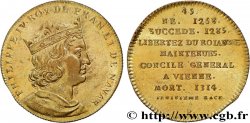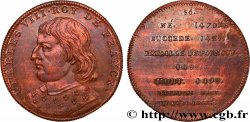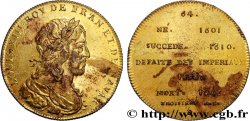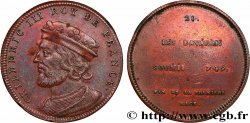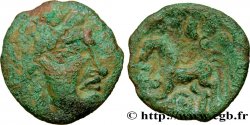fjt_743083 - SÉRIE MÉTALLIQUE DES ROIS DE FRANCE Règne de CHARLES VII - 54 - Émission de Louis XVIII n.d.
45.00 €
Количество
Добавить в корзину

Тип Règne de CHARLES VII - 54 - Émission de Louis XVIII
Дата: n.d.
Металл: brass
Диаметр: 32 mm
Ориентация осей монеты: 12 h.
Вес: 12,90 g.
Век: cannelée
Редкость: R2
Происхождение:
Exemplaire provenant de la Collection MARINECHE
Лицевая сторона
Аверс: легенда: CHARLES VII ROY DE FRANCE.
Аверс: описание: Buste couronné et drapé à gauche.
Обратная сторона
Реверс: легенда: 54 - NÉ 1402 - SUCCEDE 1422 - LES ANGLOIS CHASSEZ - MORT 1461 - TROISIEME RACE / P..
Реверс: Описание: en sept lignes.
Комментарий
Charles VII de France, dit Charles le Victorieux ou encore Charles le Bien Servi, né à Paris le 22 février 1403 et mort à Mehun-sur-Yèvre, entre Bourges et Vierzon, le 22 juillet 1461, fut roi de France de 1422 à 1461. Il est le cinquième roi de la branche dite de Valois de la dynastie capétienne.
Charles VII est le fils de Charles VI et d'Isabeau de Bavière.
Roi indissociable de l'épopée de Jeanne d'Arc, il réussit à renverser une situation compromise pour se faire sacrer à Reims le 17 juillet 1429. Il met fin en 1453 à la guerre de Cent Ans sur une victoire française.
Très contesté dans sa légitimité même, Charles devient roi en 1422 en pleine guerre civile entre Armagnacs et Bourguignons, compliquée d'une intervention militaire anglaise victorieuse depuis la bataille d'Azincourt (1415). Chef de fait du parti Armagnac, il est déshérité par son père au traité de Troyes (1420) au profit du roi Henri V d'Angleterre puis du fils de ce dernier, Henri VI. Replié au sud de la Loire, le « roi de Bourges », comme on le surnomme par dérision, voit sa légitimité et sa situation militaire s'arranger nettement grâce à l'intervention de Jeanne d'Arc, et de Gilles de Montmorency-Laval dit Gilles de Rais qu'il fait maréchal de France en 1429. Ceux-ci délivrent Orléans et conduisent Charles à la cérémonie du sacre à Reims.
Souvent critiqué par la postérité pour avoir ralenti la reconquête de la France commencée par Jeanne d'Arc et pour l'avoir abandonnée à son sort après la victoire, Charles la fait néanmoins réhabiliter solennellement en 1456 et laver de toute accusation d'hérésie. Achevant de chasser les Anglais du royaume, il s'emploie également à rétablir l'économie grâce à Jacques Cœur, le gallicanisme et l'autorité royale.
Pour la suite de la biographie, voir http://fr.wikipedia.org/wiki/Charles_VII_de_France.
Charles VII of France, known as Charles the Victorious or Charles the Well Served, born in Paris on February 22, 1403 and died in Mehun-sur-Yèvre, between Bourges and Vierzon, on July 22, 1461, was King of France from 1422 to 1461. He is the fifth king of the so-called Valois branch of the Capetian dynasty..
Charles VII is the son of Charles VI and Isabeau of Bavaria.
A king inseparable from the epic of Joan of Arc, he succeeded in reversing a compromised situation to have himself crowned in Reims on July 17, 1429. In 1453 he ended the Hundred Years' War with a French victory..
Highly contested in his very legitimacy, Charles became king in 1422 in the midst of a civil war between the Armagnacs and the Burgundians, complicated by a victorious English military intervention since the Battle of Agincourt (1415).. De facto leader of the Armagnac party, he was disinherited by his father at the Treaty of Troyes (1420) in favor of King Henry V of England and then of the latter's son, Henry VI.. Having retreated to the south of the Loire, the \\\"king of Bourges\\\", as he was derisively nicknamed, saw his legitimacy and military situation improve significantly thanks to the intervention of Joan of Arc and Gilles de Montmorency-Laval, known as Gilles de Rais, whom he made Marshal of France in 1429.. They freed Orleans and led Charles to the coronation ceremony in Reims..
Often criticized by posterity for having slowed down the reconquest of France begun by Joan of Arc and for having abandoned her to her fate after the victory, Charles nevertheless had her solemnly rehabilitated in 1456 and cleared of all accusations of heresy.. Having completed the expulsion of the English from the kingdom, he also worked to restore the economy thanks to Jacques Coeur, Gallicanism and royal authority..
For the rest of the biography, see http://fr. Wikipedia. org/wiki/Charles_VII_de_France
Charles VII est le fils de Charles VI et d'Isabeau de Bavière.
Roi indissociable de l'épopée de Jeanne d'Arc, il réussit à renverser une situation compromise pour se faire sacrer à Reims le 17 juillet 1429. Il met fin en 1453 à la guerre de Cent Ans sur une victoire française.
Très contesté dans sa légitimité même, Charles devient roi en 1422 en pleine guerre civile entre Armagnacs et Bourguignons, compliquée d'une intervention militaire anglaise victorieuse depuis la bataille d'Azincourt (1415). Chef de fait du parti Armagnac, il est déshérité par son père au traité de Troyes (1420) au profit du roi Henri V d'Angleterre puis du fils de ce dernier, Henri VI. Replié au sud de la Loire, le « roi de Bourges », comme on le surnomme par dérision, voit sa légitimité et sa situation militaire s'arranger nettement grâce à l'intervention de Jeanne d'Arc, et de Gilles de Montmorency-Laval dit Gilles de Rais qu'il fait maréchal de France en 1429. Ceux-ci délivrent Orléans et conduisent Charles à la cérémonie du sacre à Reims.
Souvent critiqué par la postérité pour avoir ralenti la reconquête de la France commencée par Jeanne d'Arc et pour l'avoir abandonnée à son sort après la victoire, Charles la fait néanmoins réhabiliter solennellement en 1456 et laver de toute accusation d'hérésie. Achevant de chasser les Anglais du royaume, il s'emploie également à rétablir l'économie grâce à Jacques Cœur, le gallicanisme et l'autorité royale.
Pour la suite de la biographie, voir http://fr.wikipedia.org/wiki/Charles_VII_de_France.
Charles VII of France, known as Charles the Victorious or Charles the Well Served, born in Paris on February 22, 1403 and died in Mehun-sur-Yèvre, between Bourges and Vierzon, on July 22, 1461, was King of France from 1422 to 1461. He is the fifth king of the so-called Valois branch of the Capetian dynasty..
Charles VII is the son of Charles VI and Isabeau of Bavaria.
A king inseparable from the epic of Joan of Arc, he succeeded in reversing a compromised situation to have himself crowned in Reims on July 17, 1429. In 1453 he ended the Hundred Years' War with a French victory..
Highly contested in his very legitimacy, Charles became king in 1422 in the midst of a civil war between the Armagnacs and the Burgundians, complicated by a victorious English military intervention since the Battle of Agincourt (1415).. De facto leader of the Armagnac party, he was disinherited by his father at the Treaty of Troyes (1420) in favor of King Henry V of England and then of the latter's son, Henry VI.. Having retreated to the south of the Loire, the \\\"king of Bourges\\\", as he was derisively nicknamed, saw his legitimacy and military situation improve significantly thanks to the intervention of Joan of Arc and Gilles de Montmorency-Laval, known as Gilles de Rais, whom he made Marshal of France in 1429.. They freed Orleans and led Charles to the coronation ceremony in Reims..
Often criticized by posterity for having slowed down the reconquest of France begun by Joan of Arc and for having abandoned her to her fate after the victory, Charles nevertheless had her solemnly rehabilitated in 1456 and cleared of all accusations of heresy.. Having completed the expulsion of the English from the kingdom, he also worked to restore the economy thanks to Jacques Coeur, Gallicanism and royal authority..
For the rest of the biography, see http://fr. Wikipedia. org/wiki/Charles_VII_de_France







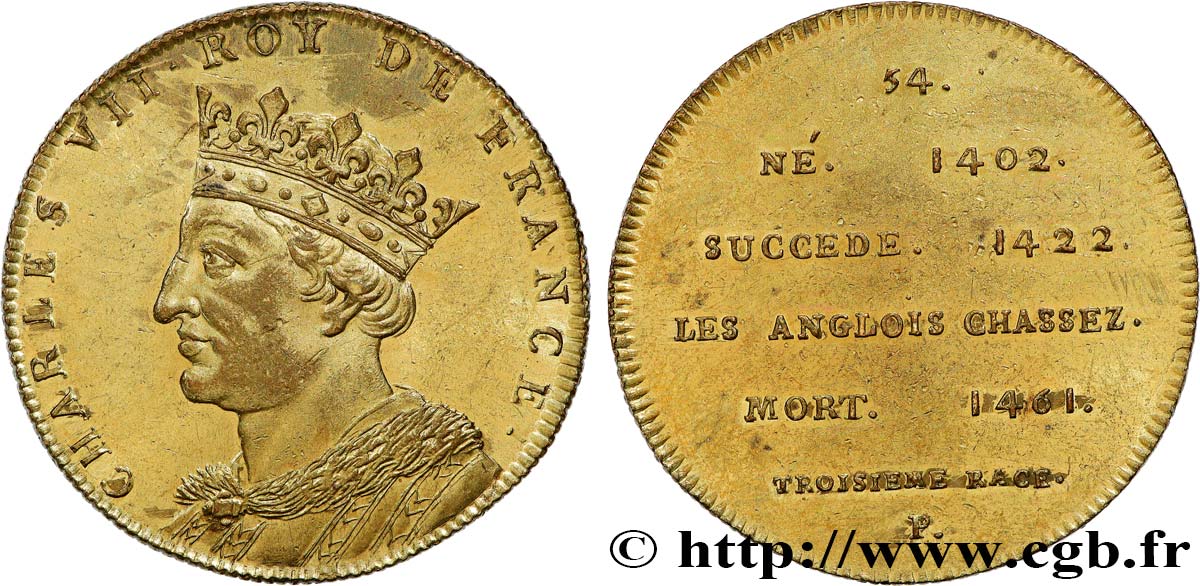
 Cообщить об ошибке
Cообщить об ошибке Распечатать страницу
Распечатать страницу Отправить мой выбор
Отправить мой выбор Задать вопрос
Задать вопрос Consign / sell
Consign / sell
 Информация
Информация